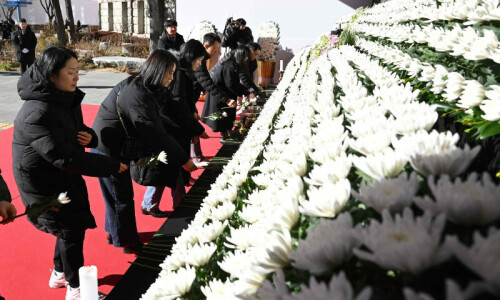MANILA: Afghanistan's first and only female provincial governor and an aid worker from Myanmar's Kachin minority are among the winners of this year's prestigious Ramon Magsaysay awards, the award foundation said on Wednesday.
The Manila-based Ramon Magsaysay Award Foundation, named after a popular Filipino president who was killed in a plane crash, was established in 1957 to honour people or groups who change communities in Asia for the better. Both Habiba Sarabi, governor of the Afghan province of Bamyan, and Myanmar aid worker Lahpai Seng Raw did not allow their minority origins to stop them from empowering other people, said the foundation.
Sarabi, a 55-year-old member of the minority Hazara group, was recognised for promoting education and women's rights despite working in an impoverished and war-torn environment, it said.
Lahpai Seng Raw — founder of Myanmar's largest civil society group which runs healthcare, agriculture and peace projects in Kachin state — was selected for helping people across ethnic groups under conditions of armed conflict. The 64-year-old widow, who is a Christian from the Kachin minority, was commended for working with both the government and rebels.
A Filipino healthcare pioneer, a Nepalese anti-human trafficking organisation and an Indonesian anti-corruption group are the other winners of the awards to be handed out on Aug 31, the foundation said in a statement.
“The Magsaysay awardees... are all deeply involved in creating sustainable solutions to seemingly intransigent social problems in their respective societies,” foundation president Carmencita Abella said.
“Working selflessly in unpretentious yet powerful ways, they are showing us how commitment, competence and collaborative leadership can truly create ripples of change, even from the bottom of the pyramid.” Medical researcher Ernesto Domingo, 76, was honoured for advancing universal healthcare in the Philippines where government funding for health remains weak.
The Nepalese group Shakti Samuha (Power Group), formed by survivors of human trafficking, was recognised for helping fellow victims by setting up halfway homes and emergency shelters.
The other awardee, Komisi Pemberantasan Korupsi (Corruption Eradication Commission), received praise for a 100-per cent conviction rate in the 169 cases it fought between 2004 and 2010, during which it recovered more than $80 million in stolen Indonesian state assets and funds.—AFP










































Dear visitor, the comments section is undergoing an overhaul and will return soon.